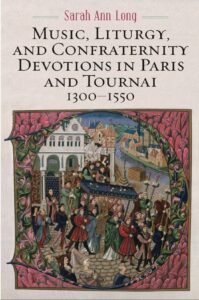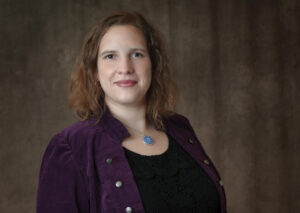
In Music, Liturgy, and Confraternity Devotions in Paris and Tournai, 1300-1550 , Sarah Ann Long’s groundbreaking work uncovers a cultural phenomenon that continues to influence the music performed and studied today.
While Sarah Ann Long sees how her research may seem esoteric, her groundbreaking work has uncovered a cultural phenomenon central to the lives of men and women 500 years ago that continues to influence the music performed and studied today.
Long, an associate professor of musicology in the Michigan State University College of Music, deeply examines the musical freedoms of lay communities in the late medieval and early renaissance periods. Her research focuses on confraternities — organizations constructed around trades, like modern-day guilds, that also had a charitable and religious purpose.
Music, Liturgy, and Confraternity Devotions in Paris and Tournai, 1300-1550 explores the religious practices of tradespeople who came together in confraternities to worship through masses and prayer services that honored the patron saint of their trade. Music was fundamental to these devotions, and Long’s research shows how these lay communities had a direct hand in constructing the liturgies that served as the foundation for their religious practices.
Her discovery goes against the popular modern narrative that the Catholic Church tightly controlled devotional practices, and that liturgy was unchanging.
“New chants for the mass and for prayer services or offices were being composed throughout this period, particularly those for the Virgin Mary,” said Long. “Some of these melodies are still used in church today.”
The book is the first in-depth study on the composition of new plainchant in northern-French confraternities for masses and offices in honor of saints thought to have healing powers. Long’s work is considered groundbreaking for a number of fields in medieval studies, including musicology, history, art history, and literature. Her book also provides insights into current religious practices.

In her book, Sarah Ann Long, an associate professor of musicology in the Michigan State University College of Music, examines the musical freedoms of lay communities in the late medieval and early renaissance periods.
All too often, Long said, scholarship focuses on music at courts and major ecclesiastical institutions. Long’s book examines the lives of men and women who were not members of the aristocracy, but who played a significant and active role in music making through their lay communities. She pointed out, too, that confraternities commissioned artwork, had chapels built, and commissioned manuscripts and musical compositions.
“As someone invested in medieval and renaissance studies working in a music school, students often react to my work by saying ‘my, that is very specific’ because it falls outside of the common practice period of music they perform,” said Long. “I make sure to highlight these communities and their practices as much as possible to help my students reflect on the impact confraternities had on the music they perform and study today.”
Music, Liturgy, and Confraternity Devotions in Paris and Tournai, 1300-1550 was published in 2021 by Boyell & Brewer. To order or for more information, visit the Boydell & Brewer website.



